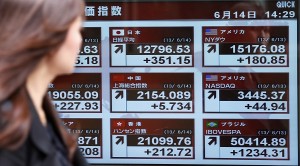Asia stocks fall after China aims at shadow loans

A woman looks at an electronic stock board of a securities firm in Yokohama, near Tokyo, Friday, June 14, 2013. INQUIRER file photo
BANGKOK — Asian stocks sank Monday after China allowed commercial lending rates to soar in a move analysts said was aimed at curbing a booming underground lending industry.
Analysts say the spike late Thursday in the country’s interbank lending rate to over 13 percent was part of an effort to trim off-balance-sheet lending that could threaten the financial stability of the world’s second-largest economy.
But markets feared the move could also hurt economic growth. China’s major state-owned banks are unwilling to lend to any but their biggest clients, so the vast majority of smaller businesses must rely on informal lending.
On Monday, the central bank told China’s commercial lenders to focus on lending to the “real economy” rather than financial speculation. A statement on the bank’s website made no mention of informal banking but told lenders to do a better job of forecasting credit and liquidity needs.
The government’s Xinhua News Agency said in a commentary that Chinese banks had been taking growing risks by diverting money into speculative investments and largely unmonitored underground banking.
Article continues after this advertisement“It is not that there is no money but that the money is being put in the wrong place,” the government’s Xinhua News Agency said in a commentary. “The more important question to consider is not whether there is a shortage of money but how it is being used.”
Article continues after this advertisementAnalysts at Moody’s Investors Service said that they interpret the central bank’s action as “having been the result of a conscious decision” to curb credit growth.
Moody’s added that a prolonged credit crunch could threaten Chinese companies, “especially those in the private sector with weak credit quality, because it heightens the risk that banks will scale back lending to those companies.” Moody’s says that China’s central government finances remain strong, but that rapid credit growth and liabilities at the local level pose a threat to growth.
Andrew Sullivan of Kim Eng Securities in Hong Kong said China’s new leaders want credit to be available to keep the economy moving but not so much as to promote asset bubbles.
“After six months in power, the new leadership is putting its policies in place. It’s signaling that credit is going to remain tight,” Sullivan said. “All that is in line with moving China from being an export driven economy to being a domestic consumption economy.”
Hong Kong’s Hang Seng fell 1.4 percent to 19,978.90. In the mainland, the Shanghai Composite Index plunged 3 percent to 2,010.77. The Shenzhen Composite Index lost 3.1 percent to 910.17.
Japan’s Nikkei 225 index, the regional heavyweight, was down 0.3 percent to 13,194.10.
Australia’s S&P/ASX 200 shed 1.3 percent at 4,678.90. Benchmarks in Singapore, Indonesia and the Philippines fell. Taiwan’s rose.
Among individual stocks, Australia’s Newcrest Mining Ltd. fell 6.7 percent. BHP Billion Ltd. fell 3 percent. Hong Kong-listed Agricultural Bank of China fell 2.9 percent.
On Wall Street on Friday, stocks rose after investors decided that the sell-off earlier in the week may have been overdone. The Federal Reserve on Wednesday gave its most detailed preview yet of how it will wind down its monthly bond purchases.
That program has made borrowing cheap and encouraged investors to buy stocks. So when the Fed hinted that it might end next the program by the middle of year, it prompted a two-day drop on the stock market. By Friday, investors were ready to buy again.
The Dow Jones industrial average rose 0.3 percent to close at 14,799.40. The Standard & Poor’s 500 index rose 0.3 percent, to 1,592.43. The Nasdaq composite fell 0.2 percent to 3,357.25.
In energy markets, benchmark oil for August delivery was down 18 cents to $93.50 per barrel in electronic trading on the New York Mercantile Exchange. The contract fell $1.71 to close at $93.69 in New York on Friday.
In currencies, the euro fell to $1.3107 from $1.3139 late Friday in New York. The dollar rose to 98.38 yen from 97.76 yen.